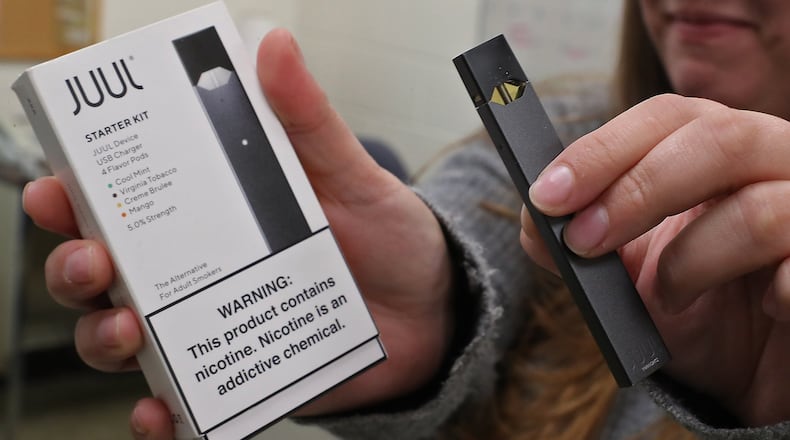“We have seen a tremendous increase in e-cigarette and JUUL use by our students. We’ve seen that increase at both the junior high school and the high school,” said Lebanon schools superintendent Todd Yohey.
Lebanon, along with other local schools, have increased the seriousness of using e-cigarettes in their disciplinary policies after finding underage students with e-cigs and related products in classrooms, at football games and outside after school, he said.
JUUL, a discreet vaporizer that looks like a flash-drive, grew in popularity among youth last year. Each JUUL pod can have as much nicotine as a whole pack of cigarettes. Many experts say youth aren’t aware that vaping even contains nicotine or could be harmful.
» RELATED: Black Friday shopping still holds importance: Here’s what you need to know
“It’s just much easier to use than traditional cigarettes — no odor, very little vapor with the right products, small devices,” Yohey said.
Local Vapor Haus co-owner Scott Pendley, who has high school-aged children, said stores like his regulate who they sell to but added underage kids are getting e-cigarettes from other high school students who may already be 18. Those students buy the e-cigarettes and e-liquids from retailers, usually online, in bulk to sell to underage teens.
“If we had a younger kid, say he’s 18, come in and say ‘I want 100 packs of that JUUL pod,’ I know what that kid’s doing, my employees know what that kids doing,” Pendley said. “We’re going to deny that sale.”
Yet some underage students are directly buying the products at convenience stores and vape shops, Yohey said. In some circumstances, parents are even buying the e-cigs for their children because they see it as a healthier alternative to the cigarettes they’re already addicted to.
Karissa Shambaugh, now 29, of Dayton is one of those teenagers who picked up cigarettes at 13 or 14 years old. She and her husband recently quit smoking tobacco because of the flavors.
“Neither of us could really breathe that well ever; going up flights of stairs was a struggle. And we’re young, so that’s not okay,” Shambaugh said. “I can breathe better, I taste all my food again…I don’t smell anymore.”
» SHOPPERS GUIDE: Here’s when retailers will open for Thanksgiving, Black Friday sales
The e-cigarettes are seen as a healthier alternative to tobacco-filled cigarettes because they deliver a flavored, nicotine-laced liquid without burning tobacco or tar. But youth are getting hooked on the flavors first, making them more likely to try combustible cigarettes, said FDA commissioner Scott Gottlieb in a statement.
Late last week, Gottlieb called for stricter age verification online and restriction of most flavored e-cigarette products at stores. Menthol, tobacco and mint flavors, that are more popular among adults, will remain on store shelves. Convenience stores are one of those targeted, with majority of the FDA’s undercover operations citing gas stations rather than specialty vape shops for illegally selling to teenagers.
Vapor Haus, with eight Dayton-area locations, is among the companies relieved by the proposed changes. Pendley said the decision is a “step in the right direction,” cutting illegal sales to youth from convenience stores and keeping responsible stores able to continue aiding adults in quitting cigarettes.
“The FDA wants to rely on (specialty vape shops) for the regulation of the sale of those flavored vaping products, which I think is a good thing,” Pendley said.
»RELATED: Area employers still need seasonal help for holidays
Pendly said vape shops, including Vapor Haus, typically spend time explaining to customers how much nicotine is in a product they buy and how to use it. That instruction could take up to 45 minutes for a first-time buyer, he said.
But if teenagers buy products online or at convenience stores, they may not know e-cigs contain nicotine at all. While e-cigarettes have seen a massive increase in the last year, they’ve been a growing concern among lawmakers for several years. Ohio’s Attorney General Mike DeWine, along with several other states, have asked the federal government to regulate e-cigarettes.
“While nicotine products are regulated federally and not by the states, Attorney General DeWine has used the bully pulpit to encourage the FDA to adopt stricter e-cigarette regulations, as well as to raise awareness to parents and teens in Ohio about the dangers of e-cigarettes and youth smoking,” said attorney general’s office spokesman Dan Tierney.
And several cities and states across the nation, including Cleveland and Columbus, have increased the legal smoking age from 18 to 21 in recent years.
FIVE FAST READS
• Area stores training employees using Virtual Reality
• 5 ways new tech will change your holiday shopping experience this year
• Store hours: Here’s when retailers will open for Thanksgiving, Black Friday sales
• Amazon plans to split HQ2 between two cities
• Ohio shifting red could impact federal resource allocation
By the numbers
3.6: Million high school and middle school students using e-cigarettes
78: Percent increase in e-cigarette use among high school students
28: Percent of high school users that use more than 20 days each month
90: Percent of adult smokers that start before turning 18 years old
About the Author
